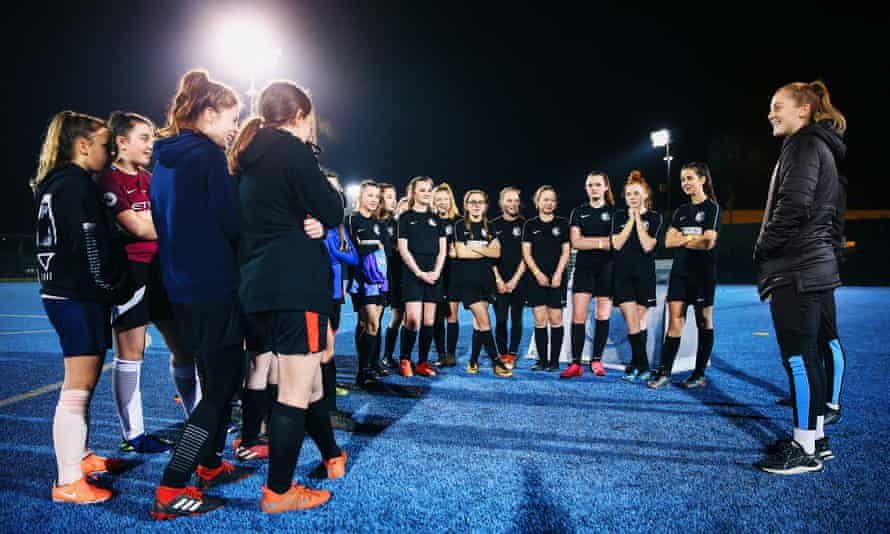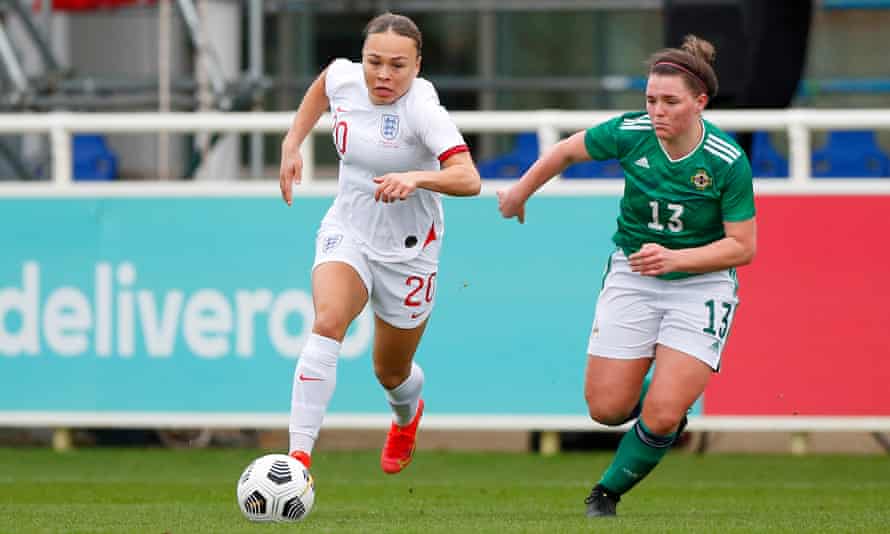England’s all-white starting XI taking a knee before the 6-0 defeat of Northern Ireland highlighted a big problem. It is a problem seemingly getting worse: women’s football is very, very white.
This is not meant to be in any way a slight on the players who bent knees to the ground on Tuesday. Allies are important. As long as they are aware that taking a knee is not a formality and should not be the extent of their support for the Black Lives Matter movement and a more diverse game, then it is an important gesture of solidarity. A huge number, if not all, of those players do a lot beyond the pitch and it is important to acknowledge that.
I am painfully aware that, in a similar vein, I am a white woman writing on a lack of diversity in women’s football. There are not enough women working in sports media and a woeful number of ethnic minority women in the industry.
The all-white squad announcement had already drawn attention to an issue that creeps in and out of focus at increasingly regular intervals. It was unusual in that it was exacerbated by injury to Manchester City’s Demi Stokes and travel restrictions that ruled out Lyon’s forward Nikita Parris. However, as the only black players in the 23 that travelled to France for the 2019 World Cup it is clear they are outliers.
The subsequent call-up of Bristol City’s forward Ebony Salmon after the Football Association, it is believed, was given very late notice of Parris’s absence, provoked a slew of cynicism on social media. That is unfair on Salmon, who has been in impressive form. Her addition makes sense and an initial inclusion would not have been questioned. It is also extremely hard to believe that the FA would think the call-up of one black player would quell frustrations over a lack of diversity in its showpiece women’s team.
By way of comparison, the men’s squad of 23 at the 2018 World Cup had 12 black players.
There are a number of reasons why there is a lack of diversity in women’s football, and why it has got worse (there were six black women in the 2007 World Cup squad).
The network of scouts, academies and outreach programmes is much smaller in the women’s game. Put simply, there are fewer places to play and so girls have to travel to further and they are less likely to travel independently. The professionalisation of the game has exacerbated things, because clubs have switched their basic academy set-ups and localised scouting from inner cities to their training grounds or bigger, better and more permanent facilities in the more affordable suburbs.
The legitimisation of women’s football that goes hand in hand with its professionalism also plays a part. The more acceptable it becomes as an extracurricular activity, the more middle-class parents see it as a suitable activity for their children.
There are huge cultural, social and religious barriers to all girls playing football and these affect ethnic minority girls more acutely. Then there is the impact of systemic, institutional and structural inequalities and racism that likely leave many ethnic minority families wary of putting their girls into very much a white world.
Another factor is the economic barrier and, critically, the lesser-discussed barrier of class. Girls need resources to be able to play. They need financial support with kit and boots and help with travel costs, but they also need parents or a support network able to invest a huge amount of time into their pursuit of the sport if they are to reach the top.

A majority of working-class families will struggle to provide all the support necessary and the struggles of working-class ethnic minority families are much worse. They will also find it much harder to volunteer time and resources to become coaches. Working women, who on the whole balance responsibility for the home alongside their jobs, do not have the time to coach on the side and again the situation is worse for ethnic minority women.
The Cabinet Office Race Disparity Audit, published in 2017, said: “Asian and Black households and those in the Other ethnic group were more likely to be poor and were the most likely to be in persistent poverty. Around 1 in 4 children in households headed by people from an Asian background or those in the Other ethnic groups were in persistent poverty, as were 1 in 5 children in Black households and 1 in 10 White British households.”

It also reports that ethnic minorities are more likely to receive income-related benefits and tax credits and to live in deprived areas with high levels of pollution.
This is not shocking new information. Ethnic minorities are more likely to be in insecure and low-paid jobs, to work in jobs with antisocial hours andlive in overcrowded housing.
In this pandemic, as research from the Office for National Statistics has shown, black, Asian and minority ethnic groups are at a greater risk of dying from Covid-19, with black men and women most at risk. Why? Because they are predominantly employed in jobs they cannot do from home, take a break from or take sick leave. They are key workers, working in transport, as delivery drivers, in food production and processing, as cleaners, in health and social care roles. They have had increased exposure, have not been adequately protected and are devastatingly paying the price.
Sign up to The Recap, our weekly email of editors’ picks.
Women’s football exists in this world and in this context. Where women’s football is treated as a second-class sport to the men’s game, ethnic minority women will be treated worse within it. Sport mirrors society. Women’s football cannot build a bubble that pulls ethnic minority girls into the football fold and protects them from the brutal inequalities and inherent racism of the system they and their families face daily.
Yes, it can, and should, work to address the logistical issues that prevent ethnic minority girls from playing football and challenge cultural and social norms but that is not enough. The game (clubs, players, coaches, staff, governing bodies and the media) has a more broader responsibility, as does everyone, to become involved in challenging a society set up to keep ethnic minorities downtrodden and to recognise racial inequality sits alongside all other forms of injustice.
from Football | The Guardian https://ift.tt/3pVBOih
via IFTTT

No Comment